- Home
- Robert Graves
Claudius the God c-2 Page 2
Claudius the God c-2 Read online
Page 2
Herod answered: `Jewish virtue does not agree any too well with Graeco-Roman virtue, such as you teach it, Athenodorus. But many thanks for your prophetic words. You can count on me once I am king to be a really good king; but until I am on the throne I cannot afford to be any more virtuous than the rest of my family.'
As for Herod's character, what shall I say? Most men - it is my experience - are neither virtuous nor scoundrels, good-hearted nor bad-hearted. They are a little of one thing and a little of the other and nothing for any length of time ignoble mediocrities. But a few men remain always true to a single extreme character: these are the men who leave the strongest mark on history, and I should divide them into four classes. First there are the scoundrels with stony hearts, of whom, Macro, the Guards Commander under Tiberius and Caligula, was an outstanding example. Next come the virtuous men with equally stony hearts, of whom Cato the Censor, my bugbear, was an outstanding example. The third class are the virtuous men with golden hearts, such as old Athenodorus and my poor murdered brother Germanicus. And last and most rarely found are the scoundrels with golden hearts, and of these Herod Agrippa was the most perfect instance imaginable. It is the scoundrels with the golden hearts, these anti-Catos, who make the most valuable friends in time of need. You expect nothing from them. They. are entirely without principle, as they themselves acknowledge, and only consider their own advantage. But go to them when in desperate trouble and say, `For God's sake do so-and-so for me,' and they will almost certainly do it - not as a friendly favour but, they will say, because it fits in with their own crooked plans; and you are forbidden to thank them. These anti-Catos are gamblers and spendthrifts; but that is at least better than being misers. They also associate constantly with drunkards, assassins, crooked business men, and procurers; yet you seldom see them greatly the worse for liquor themselves, and if they arrange an assassination you may be sure that the victim will not be greatly mourned, and they defraud the rich defaulters rather than the innocent and needy, and they consort with no woman against her will. Herod himself always insisted that he was congenitally a rogue. To which I would reply, `No, you are a fundamentally virtuous man wearing the mask of roguery.' This would make him angry. A month or two before Caligula's death we had a conversation of this sort. At the end of it he said, `Shall I tell you about yourself?' `There's no need,' I answered, `I'm the Official Fool of the Palace.' `Well,' he said, `there are fools who pretend to be wise men and wise men who pretend to be fools, but you are the first case I have encountered of a fool pretending to be a fool. And one day you'll see, my friend, what sort of a virtuous Jew you are dealing with.'
When Postumus had been banished Herod attached himself to Castor, my uncle Tiberius's son, and the two became known as the rowdiest young blades in the City. They were always drinking and,-if the stories told of them were true, spent the greater part of their nights climbing in and out of windows and having tussles with night-watchmen and jealous husbands and angry fathers of respectable households. Herod had inherited a good deal of money from his grandfather, who died when he was six years old, but ran through it. quickly as soon as he had the handling of it. Presently he was forced to borrow. He borrowed first from his noble friends, myself among them, in a casual way that made it difficult for us to press him for repayment. When he had exhausted his credit in this way he borrowed from rich knights, who were flattered to give him accommodation because of his intimacy with the Emperor's only son; and when they became anxious about the repayment he made up to Tiberius's freedmen who handled Imperial accounts and bribed them to give him loans from the Treasury. He always had a story ready about his golden prospects - he had been promised this or that Eastern kingdom or was to inherit so many hundred thousands of gold pieces from an old senator now at the point of death. But at last, at the age of thirty-three or so, he began to approach the end of his inventive resources; and then Castor died (poisoned by his wife, my sister Livilla, as we learned some years later) and he was obliged to give his creditors leg-bail. He would have appealed personally to Tiberius for assistance, but Tiberius had made a public statement to the effect that he did not wish ever again to see any of his dead son's friends, `for fear of his grief reviving'. That only meant, of course, that he suspected them of participation in the plot against his life which Sejanus, his chief minister, had persuaded him that Castor was contriving.
Herod fled to Edom, the home of his ancestors, and took refuge in a ruined desert fortress there. It was, I think, his first visit to the Near East since his childhood. At this time his uncle Antipas was Governor (or Tetrarch as the title was) of Galilee with Gilead. For the dominions of Herod the Great had been divided up between his three surviving sons: namely, this Antipas, his brother Archelaus, who became King of Judaea with Samaria; and his younger brother Philip, who became Tetrarch of Bashan, the country lying east of Galilee across the Jordan. Herod now pressed his devoted wife Cypros, who had joined him in the desert, to appeal on his behalf to Antipas. Antipas was not only Herod's uncle but also his brother-in-law, having married his beautiful sister Herodias the divorced wife of another of his uncles. Cypros would not consent to this at first, because the letter would have to be addressed to Herodias, who had Antipas completely under her thumb, and she had recently quarrelled with Herodias, during the latter's visit to Rome, and sworn never to speak to her again. Cypros protested that she would far rather stay in the desert among their barbarous but hospitable kinsfolk than humiliate herself before Herodias. Herod threatened to commit suicide by leaping from the battlements of the fortress, and actually persuaded Cypros that he was sincere, though I am sure that no man ever lived who was less suicidally inclined than Herod. So she wrote the letter to Herodias after all.
Herodias was much flattered by Cypros's acknowledgement that she had been in the wrong throughout the quarrel and persuaded Antipas to invite Herod and her to Galilee. Herod was made a local magistrate (with a small yearly pension) at Tiberias, the capital town which Antipas had built in honour of the Emperor. But he soon quarrelled with Antipas, an indolent, miserly fellow, who made him feel too keenly the obligations under which he was now laid. `Why, nephew, you owe your daily food and drink to me,' said Antipas one evening at a banquet to which he had invited Herod and Cypros at Tyre, where they had all gone for a holiday together, 'and I wonder that you presume to argue with me.' Herod had been contradicting him on a point of Roman Law.
Herod replied, `Uncle Antipas, that is exactly the sort of remark I should have expected you to make.'
`What do you mean, sirrah?' asked Antipas, angrily.
`I mean that you are no more than a provincial boor,' replied Herod, `as lacking in manners as you are ignorant of the principles of law which govern the Empire, and as ignorant of these principles of law as you are stingy with your money.'
`You must be drunk, Agrippa, to talk to me like this,' stuttered Antipas, very red in the face.
'Not on the sort of wine that you serve out, Uncle Antipas. I have more regard for my kidneys than that. Where in the world do you manage to lay hands on such filthy brew as this? It must take a lot of ingenuity to find it. Perhaps, it's salvage, from that long-sunken vessel that they were raising in the harbour yesterday? Or do you scald out the lees from empty wine jars with boiling camel-stale and then run the mixture into that beautiful golden mixing-bowl of yours?'
After that, of course, he and Cypros and the children had to hurry down to the docks and jump aboard the first out-going ship. It happened to take them north to Antioch, the capital city of Syria, and here Herod presented himself before the Governor of the province, by name Flaccus, who treated him very kindly for my mother Antonia's sake. For you will be surprised to hear that my mother, that virtuous woman, who set her face resolutely against extravagance and disorderliness in her own household, had taken a great liking to this scapegrace. She felt a perverse admiration for his dashing ways, and he used often to come to her for advice and with an air of sincere repentance give her a full account
of his follies. She always professed herself shocked by his revelations but certainly derived a deal of pleasure from them and was much flattered by his attentiveness. He never asked her for any loans of money, or not in so many words, but she used voluntarily to lend him quite large sums from time to time on promise of good behaviour. Some of it he paid back. It was really my money, and Herod knew it, and used afterwards to come and thank me profusely as if I were the actual giver. I once suggested to my mother that she was perhaps a little over-liberal to Herod; but she flew into a rage and said that if money had to be wasted she would rather see it wasted in decent style by Herod than diced away by me in low pot-houses with my disreputable friends. (I had had to conceal the dispatch of a large sum of money to help my brother Germanicus pacify the mutineers on the Rhine; so I had pretended that I had lost it by gambling.) I remember once asking Herod whether he did not sometimes grow impatient with my mother's long discourses to him about Roman virtue. He said, `I greatly admire your mother, Claudius, and you must remember that I am still an uncivilized Edomite at heart, and that it is therefore a great privilege to be instructed by a Roman matron of the highest blood and of such unblemished character. Besides, she talks the purest Latin of anyone in Rome. I learn more from your mother, in a single one of her lectures, about the proper, placing of subordinate phrases and the accurate choice of adjectives, than I would from attending a whole course of expensive lectures by a professional grammarian.'
This Governor of Syria, Flaccus, had served under my father and so had come to have a-great admiration for my mother, who always accompanied him on his campaigns. After my father's death he made my mother an offer of marriage, but she refused him, saying that, though she loved him as a very dear friend and would continue; to do so, she owed it to her glorious husband's memory never to marry again. Besides, Flaccus was many years her junior and there would have been unpleasant talk if they had married. The two carried on a warm correspondence for a great many years until Flaccus died, four years before my mother. Herod knew about this correspondence and gained Flaccus's goodwill by frequent references to my mother's nobility of soul and beauty and kindliness. Flaccus himself was no moral paragon: he was famous at Rome as the man who once, challenged by Tiberius at a banquet, matched him cup for cup throughout one day and two whole nights of uninterrupted drinking. As a courtesy to his Emperor he let Tiberius drain the last cup at dawn of the second day and so come, off victorious; but Tiberius was plainly exhausted and Flaccus, according to witnesses, could have continued at least an hour or two longer. So Flaccus and Herod got on very well together. Unfortunately Herod's younger brother Aristobulus was also in Syria and the two were not friends; Herod had obtained some money from him once, promising to invest it for him in a trading venture to India, and had afterwards told him that the ships had gone to the bottom. But it turned out that not only had the ships not gone to the bottom, but they had never sailed. Aristobulus complained to Flaccus about this swindle, but Flaccus said that he was sure that Aristobulus was mistaken about his brother's dishonesty and that he did not wish to take sides in the matter or even to act as adjudicator. However, Aristobulus kept a close watch on Herod, aware that he needed money badly and suspecting that he would get it by some sort of sleight of hand: he would then blackmail him into paying the trading debt.
A year or so later there was a boundary dispute between Sidon and Damascus; and the Damascenes, knowing how much Flaccus had come to depend on Herod for advice in arbitrating on matters of this sort - because of Herod's remarkable command of languages and his capacity, inherited no doubt from his grandfather Herod, for sifting the contradictory evidence given by Orientals - sent a secret deputation to Herod offering him a large sum of money, I forget how much, if he would persuade Flaccus to give a verdict in their favour. Aristobulus found out about this, and when the case was over, settled in favour of Damascus by the persuasive pleading of Herod, he went to Herod and told him what he knew, adding that he now expected payment of the shipping debt. Herod was so angry that Aristobulus was lucky to escape with his life. It was quite clear that he could not be frightened into paying back a single penny, so Aristobulus went to Flaccus and told him about the bags of gold that would shortly be arriving for Herod from Damascus. Flaccus intercepted them at the City gate and then sent for Herod, who, in the circumstances, could not deny that they were sent in payment for services rendered in the matter of the boundary dispute. But he put a bold face on it and begged Flaccus not to regard the money as a bribe, for he had, while giving evidence in the case, kept strictly to the truth: Damascus had justice on its side. He told Flaccus, too, that the Sidonians had also sent him a deputation whom he had dismissed, telling them that he could do nothing to help them, for they were in the wrong.
`I suppose Sidon didn't offer you so much money as Damascus,' sneered Flaccus.
`Please do not insult me,' Herod virtuously replied.
I refuse to have justice in a Roman court bought and sold like merchandise.' Flaccus was thoroughly vexed.
`You judged the case yourself, my Lord Flaccus,' said Herod.
`And you made a fool of me in my own court,' Flaccus raged. 'I have done with you. You can go to Hell for all I care, and by the shortest road.'
`I am afraid that it will be the Taenaran road,' said Herod, `for if I die now I won't have a farthing in my purse to pay the Ferryman.' (Taenarum is the southermost promontory of the Peloponnese, where there is a short cut to Hell which avoids the River Styx. It was by this way that Hercules dragged the Dog Cerberus to the Upper World. The thrifty natives of Taenarum bury their dead without the customary coin in the mouth, knowing that they will not need it to pay Charon their ferryfare.) Then Herod said, `But, Flaccus, you must not lose your temper with me. You know how it is. I didn't think that I was doing wrong: It is difficult for an Oriental like myself, even after nearly thirty years of City education, to understand your noble Roman scruples in a case of this sort. I see the matter in this light: the Damascenes were employing me as a sort of lawyer in their defence, and lawyers at Rome are paid enormous fees and never keep nearly so close to the truth, when presenting their cases, as I did. And certainly I did the Damascenes a good service in presenting their case so lucidly to you. So what harm could there have been in taking the money, which they quite voluntarily sent me? It's not as though I publicly advertised myself as having influence with you. They flattered and surprised me by suggesting that it might be so Besides, as the Lady Antonia, that most extraordinarily wise and beautiful woman, has frequently pointed out to me
But it was no use appealing even to Flaccus's regard for my mother. He gave Herod twenty-four hours law and said that if at the end of that time he was not well on his way out of Syria he would find himself up before the tribunal on a criminal charge.
Chapter 2
HEROD asked Cypros, `Where in the world are we to go now?'
Cypros answered miserably: `So long as you don't ask me to humble myself again by writing begging letters that I would almost rather die than write, I don't care where we go. Is India far enough away from our creditors?'
Herod said, `Cypros, my queen, we'll survive this adventure as we have survived many others and live to a prosperous and wealthy old age together. And I give you my solemn word that you'll have the laugh against my, sister Herodias before I have finished with her and her husband.'
'That ugly harlot,' Cypros cried with truly Jewish indignation. For, as I told you, Herodias had not only committed incest by marrying an uncle but had divorced him in order to marry her richer and more powerful uncle Antipas. The Jews could make certain allowances for the incest, because marriage between uncle and niece was a common practice among Eastern royal families - the Armenian and Parthian royal families especially - and the family of Herod was not of Jewish origin. But divorce was regarded with the greatest disgust by every honest Jew (as, formerly, by every honest Roman) as being shameful both to the husband and to the wife; and nobody who had been under the disagree
able necessity of getting divorced would consider it the first step towards remarriage. Herodias had, however, lived long enough at Rome to be able to laugh at these scruples. Everyone at Rome who is anyone gets divorced sooner or later. (Nobody, for instance, could call me a profligate, and yet I have divorced three wives already and may come to divorcing my fourth.) So Herodias was most unpopular in Galilee.
Aristobulus went to Flaccus and said 'In recognition of my services,, Flaccus, would you perhaps be generous enough to give me that confiscated money from Damascus? It would, almost cover the debt that Herod owes me - the shipping fraud that I told you about some months ago.'
Flaccus said: `Aristobulus, you have done me no service at all. You have been the cause of a breach between me and my ablest adviser, whom I miss more than I can tell you. As a matter of governmental discipline I had to dismiss him, and as a matter of honour I cannot recall him; but if you had not brought that bribe to light nobody would have been any the wiser and I would still have had Herod to consult on complicated local questions which absolutely baffle a simple-minded Westerner like myself. It's in his blood, you see. I have, in point of fact, lived far longer in the East than he has, but he instinctively knows in cases where I can only clumsily guess.'
`What about myself?' asked Aristobulus. `Perhaps I can fill Herod's place?'
`You, little man?' Flaccus cried contemptuously. `You haven't the Herod touch. And, what's more, you'll never acquire it. You know that, as well as I do.'
`But the money?' asked Aristobulus.
`If it's not for Herod, still less is it for you. But to avoid all ill-feeling between you and me I am going to send it back to Damascus.' He actually did this. The Damascenes thought that he must have gone mad.

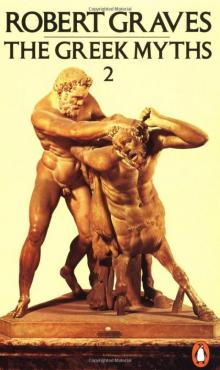 The Greek Myths, Volume2
The Greek Myths, Volume2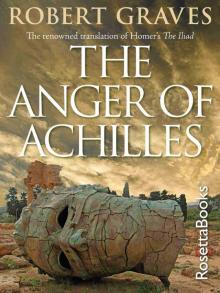 The Anger of Achilles: Homer's Iliad
The Anger of Achilles: Homer's Iliad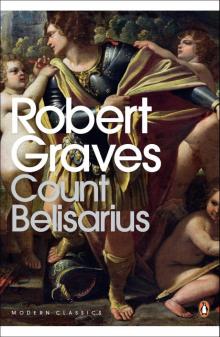 Count Belisarius
Count Belisarius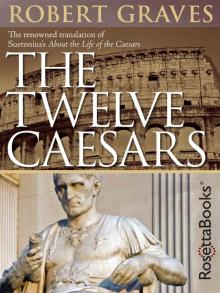 The Twelve Caesars
The Twelve Caesars Complete Poems 3 (Robert Graves Programme)
Complete Poems 3 (Robert Graves Programme) Homer's Daughter
Homer's Daughter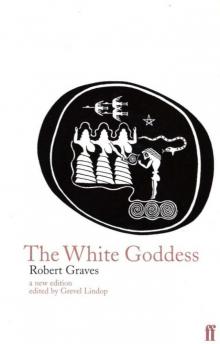 The White Goddess
The White Goddess Goodbye to All That
Goodbye to All That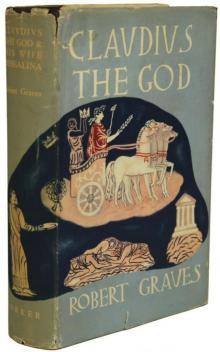 Claudius the God and His Wife Messalina
Claudius the God and His Wife Messalina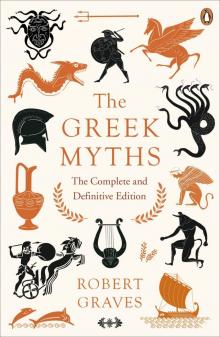 The Greek Myths
The Greek Myths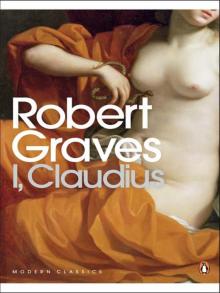 I, Claudius
I, Claudius The Islands of Unwisdom
The Islands of Unwisdom Complete Short Stories
Complete Short Stories The Golden Fleece
The Golden Fleece They Hanged My Saintly Billy
They Hanged My Saintly Billy King Jesus
King Jesus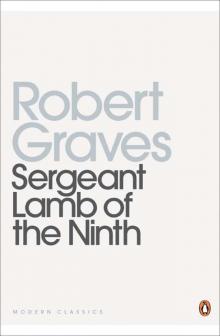 Sergeant Lamb's America
Sergeant Lamb's America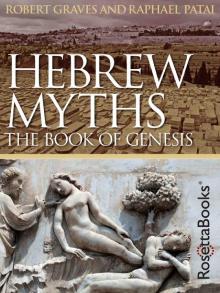 Hebrew Myths: The Book of Genesis
Hebrew Myths: The Book of Genesis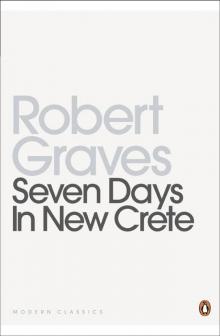 Seven Days in New Crete
Seven Days in New Crete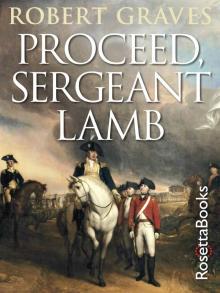 Proceed, Sergeant Lamb
Proceed, Sergeant Lamb Claudius the God
Claudius the God Wife to Mr. Milton
Wife to Mr. Milton The Complete Poems
The Complete Poems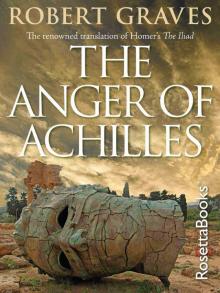 The Anger of Achilles
The Anger of Achilles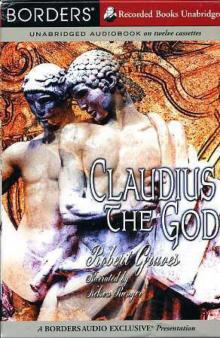 Claudius the God c-2
Claudius the God c-2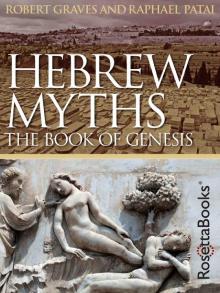 Hebrew Myths
Hebrew Myths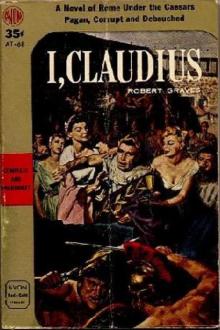 I, Claudius c-1
I, Claudius c-1 The Greek Myths, Volume 1
The Greek Myths, Volume 1